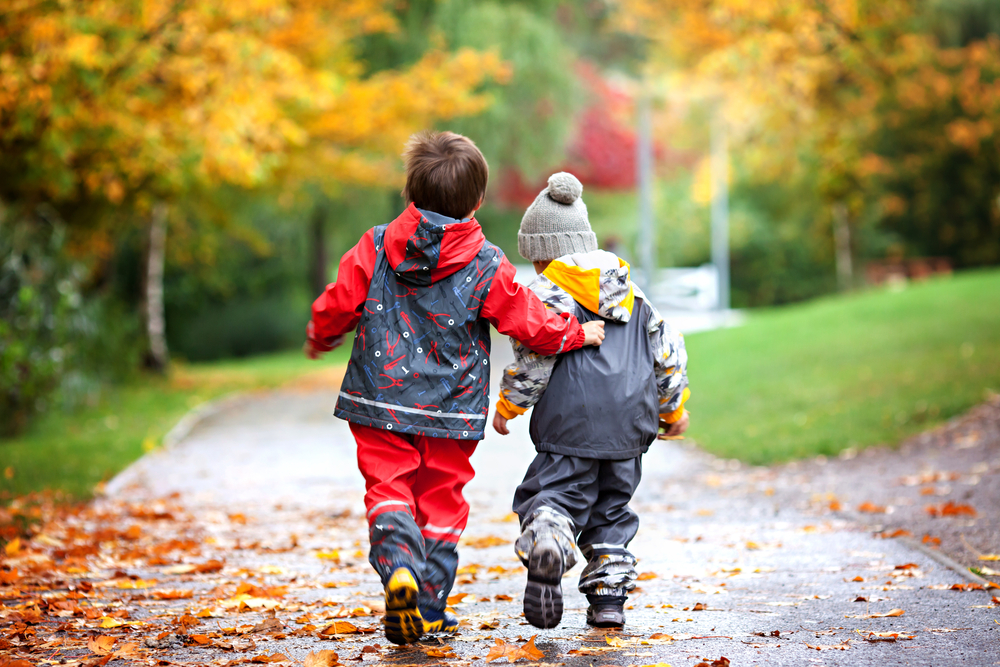
Every child can act less respectful from time to time, whether they’re asking for a larger ice cream cone or bemoaning their parents’ desire to get an expensive new gadget. And with many children having trouble controlling their emotions in the light of new adjustments to their routine courtesy of the coronavirus pandemic, tension at home is bound to be particularly heightened right now.
However, if such less-than-kind actions are not an occasional occurrence but a regular state of being, there’s a bigger issue at play— you’ve got a spoiled child. Not sure if your kid is spoiled?
With the help of mental health experts, we have rounded up the sure-fire signs that your child is spoiled. Don’t let these ungrateful behaviors follow your kids into adulthood.

They can’t stand hearing “no.”
Although few people enjoy hearing the word “no,” if your kids just can’t handle not getting their way, it’s a sure-fire sign that they’re spoiled.
“The best measure of determining whether or not a child is spoiled is how well they cope with being denied access to something they want,” says behavior therapist Jessica Leichtweisz, CEO of Hope Education Services.
However, Leichtweisz suggests that if you keep working on it, things may improve. “Tolerating ‘no’ is like a building a muscle,” she explains. “The more kids hear it, the better they get at it.”
They don’t hide their disdain for gifts they don’t want.
Gracefully accepting a gift that you don’t want is a valuable skill to learn— even for kids — and if your kids haven’t mastered it, it’s because it’s spoiled. Although most children know how to express their gratitude even when they don’t like a gift, “spoiled children prefer to be angry and aggressive or not at all receptive,” says Licensed Marriage and Family Therapist Nicole Arzt, who serves on the Family Enthusiast Advisory Board.
They refuse to follow the rules.
While every child violates the rules from time to time— a behavior that may have risen in frequency because your children spent the entire day at home — spoiled children sometimes don’t think the rules apply to them at all. Arzt notes that while most children abide by the rules of their parents because they realize the possible consequences, “spoiled children seem to think they ‘re going to be enabled or coddled by others,” even though they don’t.
They have frequent tantrums.
Tantrums are a natural part of adolescence and are likely to be more prevalent with recent changes to your little ones’ routines. But children who are overwhelmed by their parents appear to throw fits even more often— and with less provocation— than the average boy.
For many spoiled children, “they’re so used to getting their way that even at the hint of disappointment, it’s a knee-jerk reaction for them to make a fuss,” says Claire Barber, a licensed mental health consultant, and family care specialist.
They never offer help.
Although your toddler does not jump in to lend a hand to any household activity you’re working on in quarantine, if your unexpectedly home-bound teenager doesn’t open the door for you when you’ve got your hands full, that’s a major red flag, Barber says.
“This is very sad yet a common mistake parents make in not instilling the trait of thinking of others,” she explains. “It will have negative repercussions on their future interactions and relationships.”

They don’t play well with their peers.
One of the most obvious signs that your child has been overly indulged? They don’t get along with their peers — whether they take a socially distanced stroll or catch up via video chat— because of their bratty behavior.
“Working well with others is a major part of life, so helping our kids learn this early in life is a plus. It is our responsibility as parents to help them learn this,” says clinical psychologist Lori Whatley, PhD.
They refuse to do chores.
Your teenager has a lot of time on his hands these days, so if they still can’t make up their mind to pick up their room after being asked, it’s likely that the attitude stems from the place of entitlement.
“Children should be taught by their parents to do helpful tasks,” says Whatley, who notes that there are age-appropriate chores for kids starting at a very young age. “For example, requiring a five-year-old to put their toys away is responsible parenting.”
They don’t say “thank you.”
Teaching politeness is not an easy process. That being said, if your child doesn’t show appreciation even when prompted, it’s a positive indicator that they’re spoiled.
“If your child cannot express gratitude, it is a sign that they feel entitled to what is done for them and the things that are given to them,” says marriage and family therapist Virginia Williamson, LMFT, co-founder of Collaborative Counseling Group.
They start sentences with “I need.”
We all know that person who, even as an adult, begins ordering Starbucks with “I need” instead of “may I please have.” And when you recognize this distasteful behavior, there’s a good chance that the person was spoiled as a child.
“If your child feels strongly that they need everything they desire, from a snack to the newest iPhone, they may not learn the valuable life skill of distinguishing a want from a need, and will frequently experience disappointment and frustration when their wishes aren’t fulfilled,” says Williamson.
They don’t share.
Sharing can be challenging at any age — and it can be an even bigger problem now that your children spend the entire day cooped with their siblings. Nevertheless, if their lack of desire to share is persistent behavior, it is possibly due to parental indulgence.
“While it’s normal for kids to be egocentric at certain ages and have difficulty parting with things that are very important to them, your child should be able to demonstrate generosity,” whether that’s letting a sibling play with their toy or donating clothing and goods you no longer use to charity, says Williamson.

They talk to you like a peer.
If your kids talk to you with the same lack of respect they ‘re using when talking to their friends, mark one down in the spoiled column. “A child who is spoiled, largely through no fault of their own, believes that they wield the same power in the family as their parents, and will often speak to them in a dismissive or disrespectful way,” says Williamson.
They don’t show empathy.
When your child doesn’t have much sympathy for anyone, whether they refuse to make a card for a family member in the hospital or don’t seem to be bothered by what’s going on in the world around them, it should be a serious concern.
“Children of any age and developmental stage can make small gestures of empathy. This can be anything from drawing a picture for a sibling who has been sick or injured, or even as simple as giving a parent a hug when they perceive their parent is sad,” says Williamson. The unwillingness to do so is usually reflective of a child who is spoiled.
They’re unwilling to compromise.
Everybody has their emotional ups and downs, particularly in the extraordinary times we’re living in, but privileged children also are so used to being pacified by adults in their lives that their emotional control is often severely off-kilter. “If your child continues to have a hard time calming themselves down, being patient, or working towards compromise, this can be an indicator that your child is spoiled,” says Williamson.
Nevertheless, it is important to rule out other options before jumping right to the spoiled card. Williamson states that these can also be symptoms of unresolved mental health issues or learning disorders, so it’s crucial to get them tested by a professional if you don’t believe like at-home behavioral improvements are effective.
They’re not a good sport.
Losing is never fun. Nonetheless, if your child can’t cope with even small disappointments, including not winning a monopoly game, or watching their sibling score a goal in a backyard soccer game, it’s a matter that needs to be discussed.
Williamson says that your child may be spoiled if they’re “always blaming others for poor performance, expecting to be singled out for praise for everything they do, [yelling] at others who aren’t doing things their way, and [failing] to give recognition when their teammates or competitors are successful.”
They don’t have a filter.
Kids are infamous for doing the wrong things at the wrong time, whether it means giving strangers confidential information about their parents’ personal lives or sharing detailed details about the last time they got sick. But if your children are constantly unable to read the room when they’re school-aged, that’s a sign of a bigger problem.
“Whether it’s material possessions or simply attention, they will ask for what they want without any regard for the time or place,” says Sanam Hafeez, PsyD, a member of the teaching faculty at Columbia University. “For example, they may interrupt their parent and demand their attention only to show their parent something that could have waited.”

They don’t care if their behavior inconveniences others.
Times are hard for everybody right now— but a spoiled kid is unlikely to change their entitled behavior, even though what they ask of their parents or friends is no longer possible.
Spoiled kids “ask without consideration of money, time, and inconvenience to others,” says Hafeez. Ultimately, this becomes a larger issue as it “affects them later in life in relationships, school, the workplace, and other basic social interactions.”
They lash out when they don’t get their way.
“Typical of narcissists—and spoiled children are being raised to develop narcissistic traits—when they don’t get their way they will be mean and overly dramatic,” says Hafeez. “Think door slamming, throwing things, and dishing out deep insults.”
They have poor self-esteem.
Although spoiled children may sometimes appear excessively optimistic, this is generally a façade that hides their own harsh self-criticism. “Often anxious and self-loathing, [the] adult version of a spoiled child overcompensates for low self-worth by latching onto others to build them up,” says Hafeez.
They demand special treatment.
It’s nice to make your children feel special. If your child wants to be treated as such, whatever the reason, that’s far from a positive sign.
For example, this could include “making special meals for this child many nights and not having one family meal [or] your child [insisting] on sleeping with you despite your wish to have them sleep in their own bed,” says Gail Saltz, MD, an Associate Professor of Psychiatry at the NY Presbyterian Hospital Weill-Cornell School of Medicine.
They bully others.
Bullying can happen even when children are not physically present at school, and this activity often has a surprising origin: excessively permissive parenting. Spoiled children “are only mindful of their own emotions, not others,” says Saltz, who notes that this may lead to meanness and bullying toward their friends.

They’re manipulative.
If the expression, “Mom lets me do that because she loves me more than you do” is part of your child ‘s vocabulary, it’s about time you rethink your parenting approach.
“A spoiled child will use parents as pawns to serve their agenda,” says Hafeez. “They’ll even pit parent against parent, and pair up with the parent who aligns with their way.”
They always ask for more.
A rich kid rarely appreciates what they’ve got. Sometimes, they just keep asking for more— even though their parents are only trying to keep their heads above the surface.
“If your child is given and expecting [treats] 24/7, then their reaction to a holiday cookie may not be ‘yum, this is great!’ It may be ‘meh, I want ice cream!'” says Saltz. “If this goes on often enough, then this reflects a problem.”












































